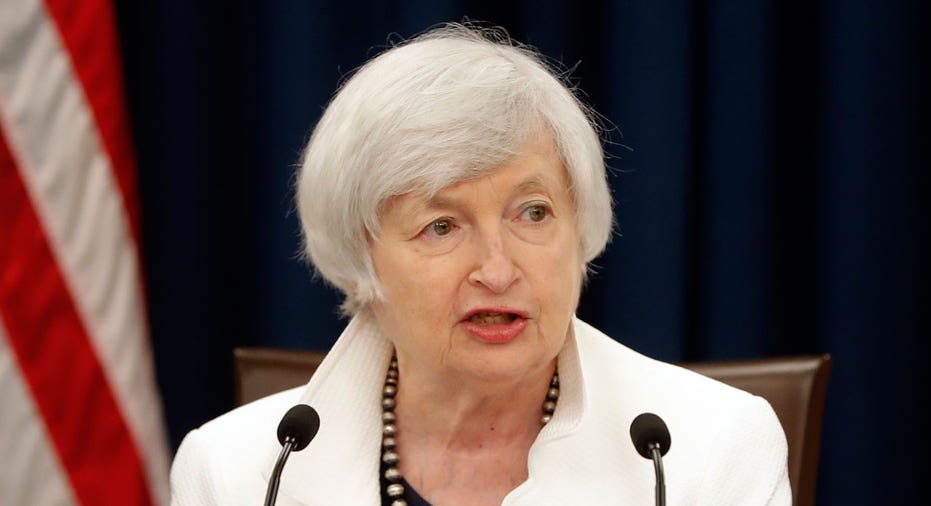Yellen says Fed will continue path of gradual rate increases

Federal Reserve Chairwoman Janet Yellen on Wednesday said the U.S. central bank will continue with its path of gradual increases in short-term interest rates, but offered no new signals about what the Fed will do at its meeting next month.
Fed officials have done little to push back against market expectations of an increase in the Fed's benchmark federal-funds rate at its Dec. 12-13 meeting. Fed governor Jerome Powell, who has been nominated to succeed Ms. Yellen next February, told lawmakers Tuesday the case for a rate increase next month "is coming together."
A rate increase next month would be the Fed's fifth such move in two years and would lift the rate to a range between 1.25% and 1.50%.
Ms. Yellen offered a mostly upbeat assessment of the economy's performance during the second half of this year. The big puzzle for the Fed has been surprising softness in inflation readings. Excluding energy and food categories, the Fed's preferred inflation gauge rose 1.3% in September from a year earlier, below the central bank's 2% target.
In Wednesday's prepared testimony to the Joint Economic Committee, Ms. Yellen repeated her view that recent low readings in consumer price growth "likely reflect transitory factors" and that as those factors fade, inflation will stabilize around the 2% target. But she also nodded more firmly to the uncertainty around her expectation. "It is also possible that this year's low inflation could reflect something more persistent," she said.
Write to Nick Timiraos at nick.timiraos@wsj.com
WASHINGTON -- Federal Reserve Chairwoman Janet Yellen on Wednesday said the U.S. central bank will continue with its path of gradual increases in short-term interest rates, but offered no new signals about what the Fed will do at its meeting next month.
Fed officials have done little to push back against market expectations of an increase in the Fed's benchmark federal-funds rate at its Dec. 12-13 meeting. Fed governor Jerome Powell, who has been nominated to succeed Ms. Yellen next February, told lawmakers Tuesday the case for a rate increase next month "is coming together."
A rate increase next month would be the Fed's fifth such move in two years and would lift the rate to a range between 1.25% and 1.50%.
Ms. Yellen offered a mostly upbeat assessment of the economy's performance during the second half of this year. The big puzzle for the Fed has been surprising softness in inflation readings. Excluding energy and food categories, the Fed's preferred inflation gauge rose 1.3% in September from a year earlier, below the central bank's 2% target.
In Wednesday's prepared testimony to the Joint Economic Committee, Ms. Yellen repeated her view that recent low readings in consumer price growth "likely reflect transitory factors" and that as those factors fade, inflation will stabilize around the 2% target. But she also nodded more firmly to the uncertainty around her expectation. "It is also possible that this year's low inflation could reflect something more persistent," she said.
Fed officials look prepared to raise interest rates in part because labor markets continue to tighten. The unemployment rate stood at 4.1% in October, below the level Fed officials believe is sustainable over the long run, and the economy appears to be growing ahead of its potential, even before Congress considers tax cuts that could propel growth higher next year.
Ms. Yellen could face questions from lawmakers Wednesday morning over how the Fed might react to any boost in demand or consumption from tax cuts being considered by Republican lawmakers given that the unemployment rate suggests there is much less slack in the economy than in recent years.
The House of Representatives earlier this month approved a tax overhaul package, and the full Senate is set to consider its tax legislation in the coming days.
Ms. Yellen didn't specifically address legislative proposals to cut taxes in her prepared remarks but did encourage Congress to consider legislation that could boost the productivity of the workforce and increase workforce participation, including policies that encourage business investment and capital formation.
"To generate a sustained boost in economic growth without causing inflation that is too high, we will need to address these underlying causes" of weak productivity and slower labor-force growth, she said.
In addition to raising rates twice this year, the Fed set into motion last month its strategy to slowly shrink the Fed's $4.5 trillion portfolio of bonds and other assets. Ms. Yellen said the run-off of that balance sheet has proceeded smoothly so far, and the Fed doesn't foresee any need to alter the program.
Ms. Yellen didn't signal significant concern about potential financial imbalances in her testimony. While asset valuations "are high by historical standards," she said the financial sector doesn't look particularly vulnerable because the banking system is better capitalized and leverage and debt growth "remain contained."
The Fed held rates near zero for seven years after the 2008 financial crisis, but with rates now farther away from that low point, the big question in the coming year is how much higher the central bank will need to lift them.
Ms. Yellen in her testimony Wednesday said the neutral rate, at which the Fed is neither trying to slow down nor speed up growth, appears to be "quite low by historical standards," which would mean interest rates don't have much further to rise. Still, she said most Fed officials expect that neutral rate to rise somewhat over time, meaning additional gradual rate increases "would likely be appropriate over the next few years to sustain the economic expansion."
Ms. Yellen will be testifying before the committee at 10 a.m. ET.
Write to Nick Timiraos at nick.timiraos@wsj.com
(END) Dow Jones Newswires
November 29, 2017 08:30 ET (13:30 GMT)



















